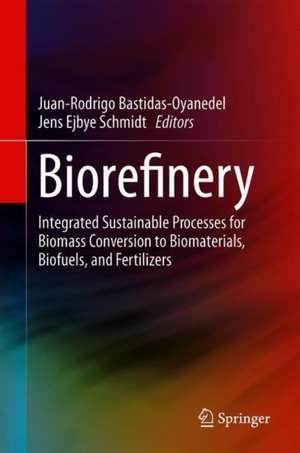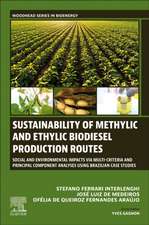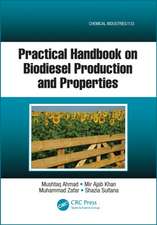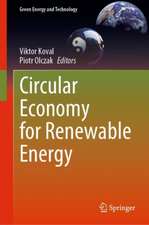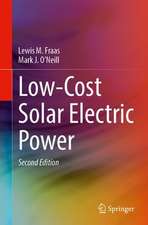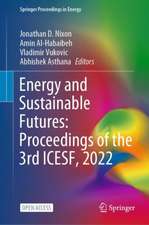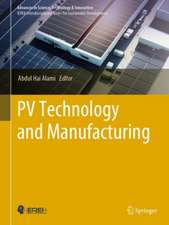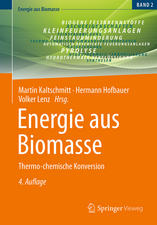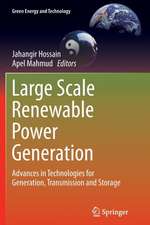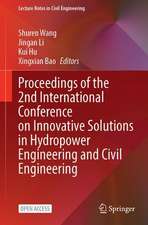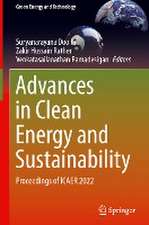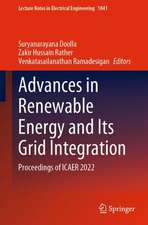Biorefinery: Integrated Sustainable Processes for Biomass Conversion to Biomaterials, Biofuels, and Fertilizers
Editat de Juan-Rodrigo Bastidas-Oyanedel, Jens Ejbye Schmidten Limba Engleză Hardback – 30 apr 2019
Preț: 921.75 lei
Preț vechi: 1124.09 lei
-18% Nou
Puncte Express: 1383
Preț estimativ în valută:
176.41€ • 183.68$ • 149.08£
176.41€ • 183.68$ • 149.08£
Carte tipărită la comandă
Livrare economică 07-21 martie
Preluare comenzi: 021 569.72.76
Specificații
ISBN-13: 9783030109608
ISBN-10: 3030109607
Pagini: 820
Ilustrații: XIV, 763 p. 193 illus., 114 illus. in color.
Dimensiuni: 155 x 235 mm
Greutate: 1.33 kg
Ediția:1st ed. 2019
Editura: Springer International Publishing
Colecția Springer
Locul publicării:Cham, Switzerland
ISBN-10: 3030109607
Pagini: 820
Ilustrații: XIV, 763 p. 193 illus., 114 illus. in color.
Dimensiuni: 155 x 235 mm
Greutate: 1.33 kg
Ediția:1st ed. 2019
Editura: Springer International Publishing
Colecția Springer
Locul publicării:Cham, Switzerland
Cuprins
Introduction.- Lignocellulosic Thermo-chemical pretreatments.- Enzymatic hydrolysis of biomass feedstocks.- Catalytic conversion of lignocellulosic biomass.- Other economically feasible lignocellulosic fractions – proteins, pigments.- Sugars based yeast fermentation.- Sugars based bacterial fermentations.- Sugars based mixed culture fermentations.- Enzymatic synthesis.- Protein based materials.- Lignin based chemical and materials.- Seawater based bioprocesses.- Pyrolysis of biomass.- Use of syngas for the production of organic molecules by fermentation.- Biogas.- Algae based biorefineries.
Notă biografică
Dr. Jens Ejbye Schmidt earned his Ph.D. in Environmental Biotechnology in 1993 from the Department of Biotechnology of the Technical University of Denmark (DTU). He is currently a full professor in Chemical Engineering at Masdar Institute, with a focus on the production of sustainable biofuels. In addition, he is head of the Institute Center for Energy (iEnergy). Before his appointment at the institute, Dr. Schmidt was head of the Bioenergy & Biorefinery Program at Risø National Laboratory for Sustainable Energy, DTU. From 2000 to 2007, he was the head of the Wastewater Group and associate professor at the Department of Environment & Resources DTU. Dr. Schmidt was an associate professor in the Anaerobic Microbiology/Biotechnology Research Group, Department of Biotechnology/Department of Applied Chemistry, DTU from 1998 to 2000 and was acting head of the group during part of the period also. He has published more than 200 technical articles and book chapters.
Dr. Juan-Rodrigo Bastidas-Oyanedel (Juan) was awarded his Ph.D. in Engineering Processes at the Laboratory of Environmental Biotechnology (LBE-INRA France) in February 2011. His research subject was the Thermodynamic modeling of Anaerobic Digestion. Juan holds undergraduate and Master's degrees in Biochemical Engineering from the Pontificia Universidad Católica de Valparaíso (Chile). Juan contributes with his expertise in bioreactor design, set-up, operation, and optimization; analytical methods for metabolic fermentation products monitoring MIMS, HPLC, GC, MS); and modeling of biological systems (Mixed and Pure microbial cultures) and electron transfer phenomena.
Textul de pe ultima copertă
This book discusses the biorefinery of biomass feedstocks. In-depth chapters highlight the scientific and technical aspects and present a techno-economic analysis of such systems. By using a TEA approach, the authors present feasible pathways for conversion of biomass (both residual biomass, energy crops and algae biomass), showing the different possibilities for the production of biochemical materials, biofuels, and fertilizers. The concepts presented in this book will link companies, investors, and governments by providing a framework that will help reduce pollutants and create a biomass related economy that incorporates the newest developments and technologies in the area.
Caracteristici
Presents a unique discussion of biomass conversion from a techno-economic perspective
Case-studies and examples are included to illustrate and demonstrate the methods presented in the book
Contains a framework to guide the process of investments, cost, and revenue of future biorefineries
Case-studies and examples are included to illustrate and demonstrate the methods presented in the book
Contains a framework to guide the process of investments, cost, and revenue of future biorefineries
